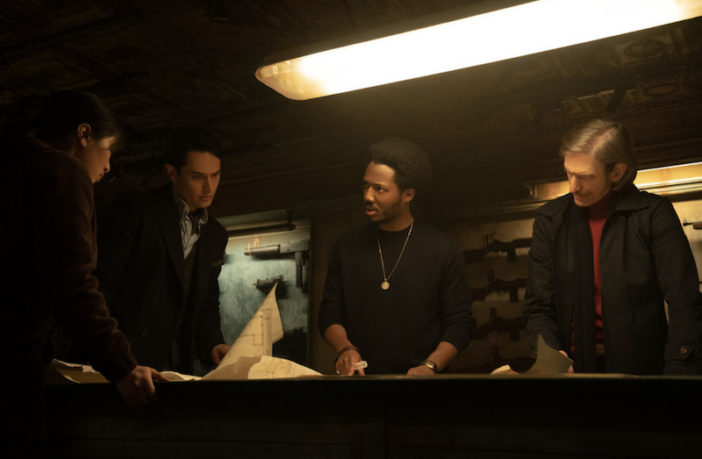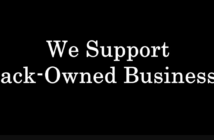Executive Producer and Director Albert Hughes has entered the world of John Wick with the premiere of his three part series ‘The Continental’ now streaming on Peacock. In a one-on-one interview with EBONY, Hughes talks about nods to his childhood, blaxploitation references and the deeply talented cast that brought the story to life.
image: Todd Williamson for Peacock.
What was the biggest draw of the project when you were first approached to take it on?
Albert Hughes: I think it’s you know, being a fan of the movies and seeing that it had nothing to do with reality and the times we were coming out of with COVID. I just wanted to have fun. And I thought the audience wanted escapism as well. So I looked at the movies, I’m like, well, there’s no reality in those movies. It’s all kind of escapism, parallel universe, of subculture of assassins, these codes, these myths. Let me see if this will be actually as fun as it looks. And I didn’t suspect or expect that it would be the most fun I’ve ever had shooting something.
Let’s go into your references, it’s back in New York in the 1970s. Right? The soundtrack was impeccable, when I watch it, like just the irony between some of the song choices for certain scenes. And also just nostalgic, how, what were your references for those and what was that experience like implementing your vision and your style?
Well, it starts from my childhood, and I grew up in the 70s. And I had a White Armenian mother and a Black father who are listening to different types of music. He’s listening to James Brown and Parliament. And she’s listening to Jimi Hendrix and Pink Floyd. So through the early part of my career, my brother, we’re able to explore the Black side a lot. And it’s a fantastic side, because it’s the best side of music, American music to me, you know, but there’s also that side of the 70s, where it was the last era that these white rock bands were doing some interesting things, whether was punk, whether it was rock and roll, or classic rock, you know, you can tell with the Stones, The Beatles, you know, Pink Floyd, but like Black Sabbath, there’s a lot of them that I grew up with, that I hadn’t tapped into. So what I did was I came up with a 10 and a half hour playlist, and the whole crew and all the cast had it and all of editorial had it. And some of them would be placed very early in the script. And some we decided later in post production. But it was kind of a chance for me to explore my childhood in a way you know, and, you know, even have nods to commercials in there from the 70s playing in the TV screen. So that was quite fun in some things are quite on the nose. Some are, like you mentioned, like more for irony. And mostly, it’s all to take the audience to a time and place of nostalgia. And also to let them know, you’re here to have fun. You’re not here to take any of this too seriously. And it’s all kind of winking and nodding at you know, it’s the thing I bring up like, I can talk to you about it’s like, when a black audience sees a movie, I’ve seen this, I’ve seen the first episode with some, let’s say, predominant black audience, and they have a good time with it. They know how to have a good time with a movie, I think sometimes the mistake would be to run into a movie or a series like this, and take it too seriously. It’s not to be taken too seriously. You know, it’s meant for a good time.
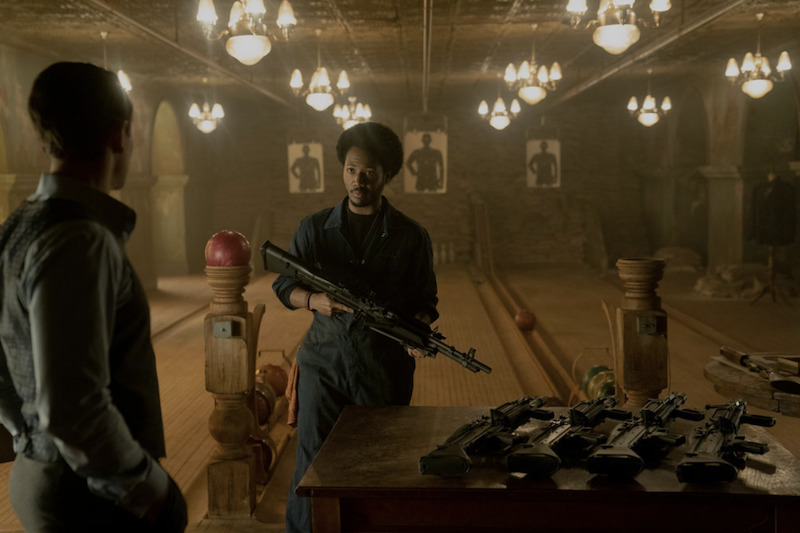 image: Katalin Vermes/Starz Entertainment
image: Katalin Vermes/Starz Entertainment
There’s a Blaxploitation feel to it a little, and I think the audience gravitates towards that. Talk to us about your choices there – the style, and your approach to the episodes.
Well, that’s also part of the childhood and growing up and you know, they coined that frame that phrase blaxploitation quite early. And, you know, surprisingly, I came from a very liberal leaning person to NAACP, who stunted the growth of black actors and Black Filmmakers at that point, because they labeled it and you know, the same thing happened in normal so called Hollywood cinema with Humphrey Bogart. And James Cagney except for they weren’t labeled. So they were able to continue and flourish and have these careers. So you know, people can look back on blaxploitation with, you know, a frown or smile. I would look back on it with a smile because it was the beginnings of something, you know, whether you liked the subject matter or not, you know, some awesome soundtracks came out of it with Isaac Hayes and you know, Curtis Mayfield, and I forgot the name of the brothers that did the Mac or maybe it wasn’t the brothers, but there was a lot of great things that came out of it, there was fashion or soundtracks, there’s actors that are still working to this day. That you know, of course, I’m nodding to them, because they were kind of forefathers and four sisters of, of this kind of flavor.
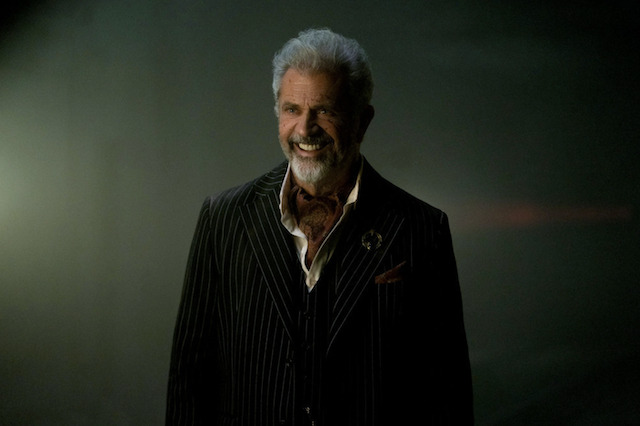 image: Katalin Vermes for Starz Entertainment
image: Katalin Vermes for Starz Entertainment
You stood firmly behind your choice to cast Mel Gibson in the face of some backlash. What can you tell us about your decision making process, and going with your intuition when it comes to casting, creative direction, etc?
With that particular casting choice, that was a group effort … it’s producers that chime in with casting choices, whether it’s him or others. It’s never one man or one woman’s choice. But I think in the end, we all felt that he was right for the part. And when people see it, they’ll understand why we think he’s right for the part. Beyond that, you know, I was more focused on like, these other very colorful characters, quite literally and figuratively, you know, and that people see the project as a whole as this diverse group of talented actors young and older, mostly young, who haven’t had the opportunity to show their talents a lot in the past. For instance, Hubert Point-Du Jour, who is of Haitian descent, I worked with on Good Lord Bird. He’s a really deeply talented actor, but he makes it look like silk. So you don’t know because he doesn’t have a flashy character, you know? Then you have Mishel Prada, who’s a deeply talented actress, a Dominican and Puerto Rican woman. Who you do see some flashes of you know, she’s doing some stuff in there, you know? And then you have this unicorn of Kate and I have to remember how to pronounce her last name, who plays Yen, the Vietnamese wife of Frankie, who we found through a tape she recorded in Vietnam for us, and I couldn’t believe her acting and then they said “wait, she has a stunt reel.” I said “she has a stunt reel?” And there was like a reel of action on like, she’s a unicorn. We have to lock her up now. There’s no way we’re gonna find someone better than her. So she also was like a sweet surprise because between takes she’s really shy and meek. And you know, when I hug her, she doesn’t like hug back. She just kind of folds into me and then you call action that she’s kicking everybody’s ass, you know? And there was some complaints that she likes contact when she’s fighting because in Vietnam, that’s how they do it. You’re actually getting kicked in the face. So some of the actors like whoa, whoa, slow down.
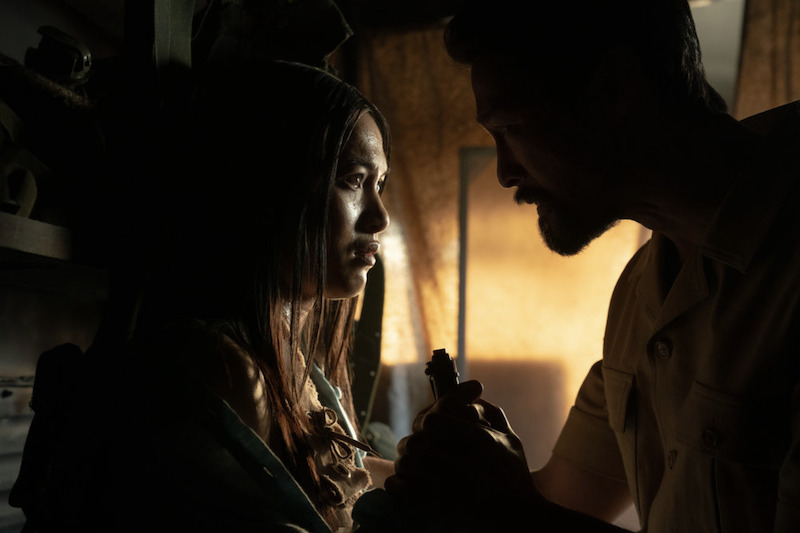 image: Katalin Vermes/Starz Entertainment
image: Katalin Vermes/Starz Entertainment
There are so many women on both sides that are just forces in characters and storylines. Was that intentional?
You know, I was just in New York a week and a half ago, you walk on the street, you’re bumping into everybody. You’re smelling different ethnic foods, you’re hearing different sounds. And I was so happy with it. And I think I subconsciously leaned in on episodes two and three, with Charlotte Brandstrom who did two and with the writer, Kirk Ward, and the showrunner Kirk Ward, who’s a very conscientious a White man … who’s a fan of action movies, [and]a fan of Black cinema. And some of it’s conscious, some of it’s subconscious. And some of it’s from my mother, you know, my mother is a pretty hardcore woman, woman. But I’m proud, I’m proud of it. And I just hope the interesting thing is how the audience takes to it. I think some of them, it just washes over and they don’t even realize it. You know, like it did me I gotta be honest, that second episode, you know, rolled over me without me realizing it. But maybe it’s because where I come from, from what I’ve seen that it’s quite, it was quite a natural look, but it’s not quite natural in everyday cinema or TV.
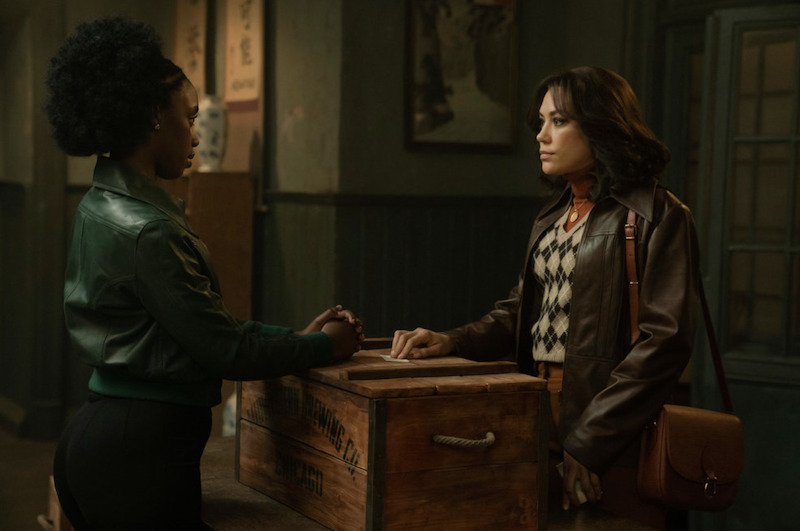 image: Katalin Vermes/Starz Entertainment
image: Katalin Vermes/Starz Entertainment
Do you have any favorite scenes that you shot either stylistically or for shooting reasons that that are your top three?
Yeah, there’s the adjudicator scene in episode one, because it was the first scene we shot of the whole series. And usually I try to find a scene that’s easy for us to shoot. That sets the tone for the crew, and the cast. And that one will always have a special place for me. Then in episode three, there’s a, I guess you would call it the assassins montage. And there’s this really goofy song called Popcorn from the 70s that’s playing when they’re all loading up and all the flaggers are going out about the enemy showing up and that’s kind of fun to me. I love Lemmy, the scene with the mailroom attendant, because it’s quite goofy. Because again, this is like a tone thing. It’s like it’s meant to be pulpy and camp. And we’re kind of leaning in on that a lot in episode three, the campiness and the pulpiness. There’s a lot of little bits in three that I do enjoy, because you get a chance to unleash. And you don’t have to serve the traumatic stories any longer. Now, it’s just one big dramatic point. It’s all about like, we’re taking over this damn hotel at all costs. And you know, some don’t make it. And then the final, there’s a scene that I do love and three that I think no one ever talks about, but I really liked it when the group finally comes together, and they have a shot of vodka, which is my favorite drink, by the way. And there’s this like silent moment that originally was written with a bunch of dialogue. And Kirk and I and the cast were like, Let’s just cut this out, and let the audience just absorb their faces and what they’ve been through. And I really liked that these actors leaned in on something that wasn’t verbal. It was all about look, there was kind of, for lack of a better description that Avengers moment, or team Avengers comes together in a shop. And they’re just sitting there, they’re just exhausted, and they’re just looking at each other.
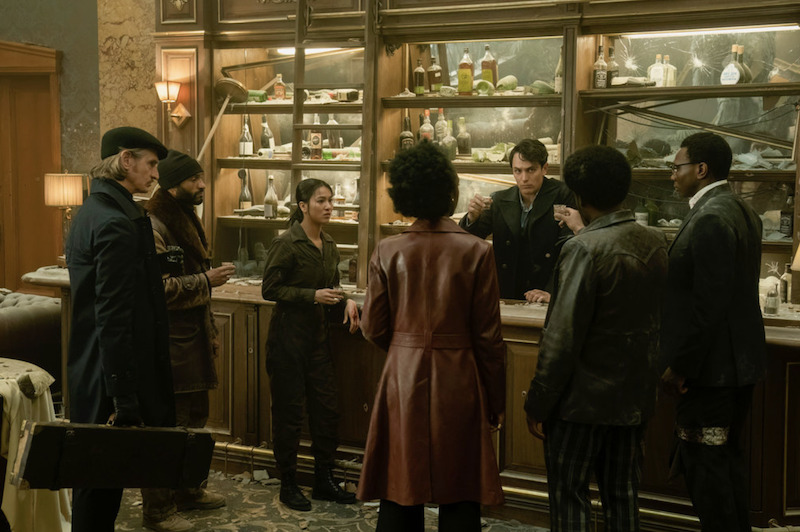 image: Katalin Vermes for Starz Entertainment
image: Katalin Vermes for Starz Entertainment
I don’t want to call out any stepchildren here, but what are your favorite storylines or characters if you have any, and then last question is what you’re most excited for viewers to experience in part three.
I want to see what happens with Winston and Charron. If you notice in the first episode, there’s a red Canary that lands in front of Cormac, and the last episode, when Winston walks away, there’s a red Canary that lands and it’s symbolism. It’s basically saying you’re in a gilded birdcage, and you could become a victim of your own power. Dose absolute power corrupt absolutely. Does Winston have to go through what Cormac went through where it goes to his head and he learns a hard lesson?
As far as what I’m excited about for people to see, I want them to absorb the whole arc of the show and know it’s going to land in this very fun and exciting whacked out place. I think they know that just from I think probably the marketing materials, but I’m most excited for them to experience like it’s a gumbo soup of influences of cinematic influences throughout the last 100 or so years of film, musical influences, acting influences, architecture, wardrobe, it’s all there you know. It’s a basically like a love letter to everything that is cinematic and the one thing no one talks about, and I know I’m running on here though, the one thing that nobody talks about in cinema is that it’s the umbrella art form that encompasses all art forms, no other art form if it is an art form does that. You have poetry, you have writing, you have sculpture, you have architecture, you have, you know, clothing, you have writing, you have the original seven arts as designed by the French term and then you have the others, photography. There is no other form that does it other than cinema. So what you would hope for is when somebody sees something that they feel the audio, visual experience and that it’s fully serviced on both ends, it’s not just an audio medium where actors are talking — that’s radio okay. Or that’s a stage play. This is a visual medium too and our form started out in a strictly visual sense. So not enough credit is given to that I think, the visual side of moviemaking basically.
